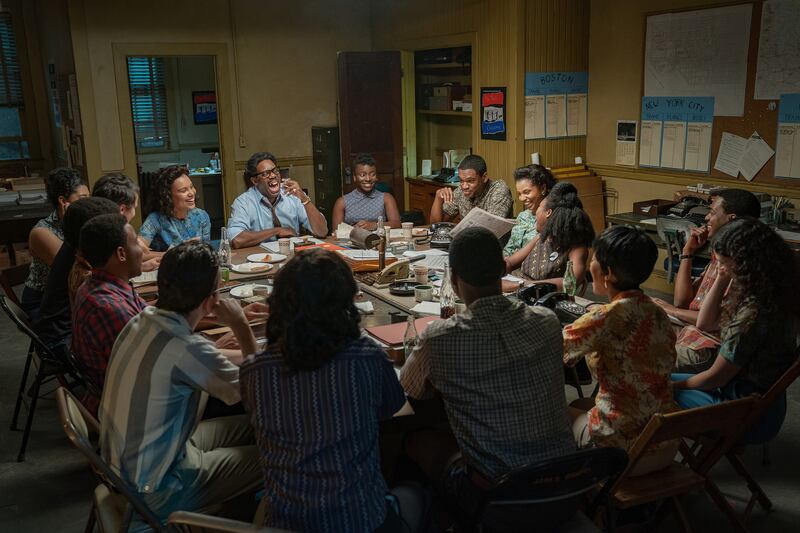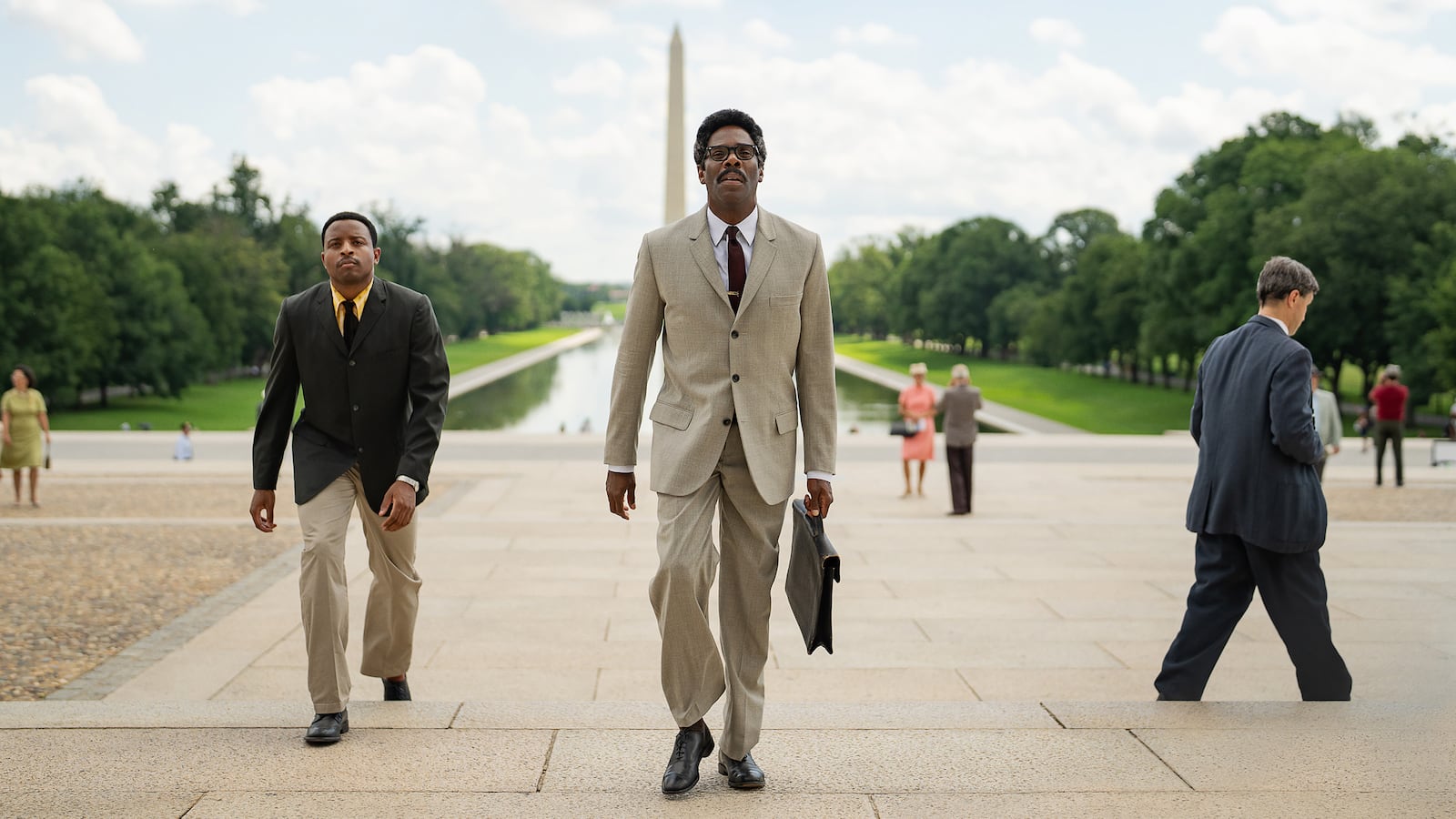On August 28, 1963, 250,000 people descended on the National Mall for the March on Washington for Jobs and Freedom, determined to have their voices heard in favor of civil rights. By its conclusion, the gathering stood as the largest peaceful protest ever held in America, and it would be immortalized courtesy of Dr. Martin Luther King Jr.’s “I Have a Dream” speech. It was a landmark in the fight for equality and helped pave the way for 1964’s Civil Rights Act, which would pass nine months later.
And it was all due to Bayard Rustin.
Rustin, George C. Wolfe’s stirring biography of the Black gay social activist, is the story of Rustin’s efforts to organize and execute this grand rally, led by a tremendous lead performance by Colman Domingo as the title character. Premiering at the Toronto International Film Festival ahead of its November theatrical and Netflix debuts, it’s a fleet and charismatic work of restoration when it comes to the March’s origins, as well as to both Rustin’s reputation and primary role in bringing it to life. While it moves so fast that it occasionally threatens to trip over its own feet, its speed is central to its vivacious energy and personality. Far from a stuffy history lesson, it’s a film that’s at once urgent, rousing, and alive.
Providing context with a rapidity that it maintains throughout the remainder of its compact and captivating 99 minutes, Rustin offers harrowing slow-motion visions of post-1954 segregationist terror in the South before leaping forward to 1960 to find Rustin and a young King (Aml Ameen) planning a protest march on the Democratic National Convention. In brief boardroom and diner scenes, Rustin and King’s friendship is apparent, yet it’s not to last, thanks to U.S. Congressman Adam Clayton Powell Jr. (Jeffrey Wright). Powell doesn’t want the event to take place and successfully thwarts it by intimating that he’ll leak a rumor to the press about King’s “queen”—i.e., Rustin, with whom he was not engaged in a romantic relationship. The tactic works, compelling King to pull out of the march and, in the process, severing his close bond with Rustin, who’s known to King’s kids as “uncle” and who claims to have been the person that convinced King to follow a non-violent civil rights path.

Rustin presents its protagonist as a revolutionary who neither hid his homosexuality and communist affiliations nor went out of his way to antagonize the powers-that-be that frowned upon them. By 1963, he’s toiling away in the War Resisters League while living his defiantly proud life, much of it shared with white boyfriend and “assistant” Tom (Gus Halper), to whom he’s unwilling to fully commit. One night, inspiration strikes, and like the entirety of the film, it’s dramatized to the sound of Branford Marsalis’s scintillating jazz score. Playful bass, blaring horns, twinkling piano and rat-a-tat-tat drums give the action its highly charged spirit, matching Rustin’s breakneck and passionate energy and, also, subtly suggesting the dangers of moving forward so boldly.
Rustin’s scheme is initially to stage a two-day, 100,000-person march—a logistical nightmare that’s further complicated by opposition from NAACP leader Roy Wilkins (Chris Rock), who views Rustin as a discarded relic. Even with the support of A. Philip Randolph (Glynn Turman), Rustin soon realizes that the only way to pull off the demonstration is by mending fences with King. Doing that proves relatively easy, which is more than can be said about his budding affair with married activist and wannabe preacher Elias (Johnny Ramey), who uneasily comes to terms with his homosexuality (at least, for a time) via their romance. In the fight for acceptance, the personal and the professional are one and the same, and Ma Rainey’s Black Bottom director Wolfe commingles them smarty, using sharp flashback fragments to underscore the traumas that shaped, and drive, the ambitious activist.
With puffy hair that’s graying on the sides, dark-rimmed glasses, an infectiously excitable voice and a missing tooth (lost in a scuffle with police), Domingo’s Rustin is a firebrand in constant straight-ahead motion, bounding over and smashing through obstacles with the tenacity of a man possessed. Rustin’s brashness is complemented by his humor and sensitivity, as well as his artistic flair; it’s not a complete surprise when he confesses that he once sang and played lute on a music LP. Domingo inhabits him with charismatic fullness, and though Julian Breece and Dustin Lance Black’s script is full of trailer-ready oration, he never succumbs to affected grandstanding. On the contrary, the actor delivers Rustin’s public and private speeches with magnetic intensity and sincerity. It’s an outstanding performance that brings every aspect of his subject to life—not least of which is his fiery dedication to his cause.
Rustin’s vigor sometimes interferes with its lucidity; a couple of scenes, such as a perilous near-encounter with shadowy white men on a late-night street, would have benefited from catching their breath. And in a few instances, its pace results in sketchy characterizations and conversations. Still, the film’s power comes from the force of its conviction, and it’s easy to get swept up in its race to the finish line—in this case, the Lincoln Memorial, where King declares, “Free at last!” and then shares a glance with Rustin that communicates many meaningful things at once.

With a sure hand, Wolfe conveys the means by which true change comes from personal vision, effective organization and grassroots toil, the latter often dependent on younger generations rejecting the oppression of the past. Most importantly, however, the director captures the essence of the civil rights movement through Rustin the man, who proves a complex individual convinced that the only way to create a more peaceful and tolerant world is by practicing, and upholding, those values.
Rustin may have to compromise in order to achieve his goal, but Rustin is ultimately the tale of a trailblazer who refused to back down in the fight for social justice—even when it cost him a seat at the table or his moment at center stage. It’s a reverential and touching tribute, and a sterling showcase for Domingo that may earn him his own forthcoming moment in the cinematic spotlight.
Liked this review? Sign up to get our weekly See Skip newsletter every Tuesday and find out what new shows and movies are worth watching, and which aren’t.






